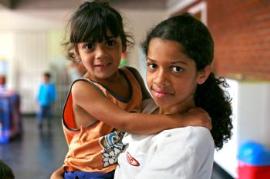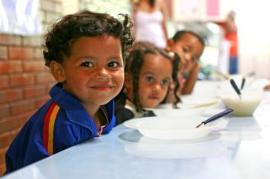In one of the world’s largest metropolises, social segregation is very strong

The SOS Children’s Village São Bernardo do Campo is located in São Paulo, capital of the state of the same name, on the southern coast of Brazil. São Paulo is the southern hemisphere’s largest city and has a population of over eleven million, and approaching 20 million in its metropolitan area.
The so-called Extended Metropolitan Complex of São Paulo, which includes conurbations bordering the city, has a total population exceeding 29 million.
In addition to heavy air pollution traffic congestion, this population explosion has led to a number of other critical problems. Large sections of the city developed without any urban planning whatsoever – entire neighbourhoods virtually sprang from the ground overnight. Today, around one million of São Paulo’s inhabitants live in illegal “favela” settlements. Some of these are built on precarious terrain prone to landslides or flooding, and there are even so-called “vertical favelas” – huge, run-down tower blocks where families live in overcrowded, appalling conditions.
São Paulo therefore continues to be a deeply divided and socially segregated city: a major industrial hub and important economic centre on the one hand, with cheap labour provided by the inhabitants of the many underdeveloped, underprivileged neighbourhoods.
Lack of education and stigmatisation deprive children of the chance they deserve
Life in the favelas is far from easy. Crime rates have successfully been reduced in recent years, but they remain at high levels and often affect young people most severely. Those who grow up in the favelas are hugely stigmatised throughout their lives; they are viewed as criminals or drug dealers and are often met with fear by people from better-off neighbourhoods. For the thousands children born into these conditions, it can be extremely difficult to overcome these prejudices on the road to becoming a successful adult
What we do in São Paulo

SOS Children’s Village São Bernardo do Campo in São Paulo began its work in 1970. In 2004, the local authorities declared that SOS Children’s Village São Bernardo do Campo was located in an environmental reserve. The SOS families slowly moved out of the village and into rented accommodation.
Strengthen families: Our social centre here provides a family strengthening programme, which aims to alleviate hardship in the community in a holistic and sustainable manner. Its services include a day-care centre and childminding programme. This allows working parents and single mothers to leave their children in safe hands while they are out making a living. Our efforts also address the needs of parents, providing support and training.
Care in SOS families: For children from the area who are no longer able to live with their parents, SOS families can provide a loving home. In each family, the children live with their brothers and sisters and are affectionately cared for by their SOS parents. The SOS families live in the community, and are therefore fully integrated into the neighbourhood.
Support for young people: Qualified counsellors support young people while they pursue further education or vocational training, some of which is delivered by SOS Children’s Villages. Young people learn to take responsibility, plan their future and prepare for independent adult life.